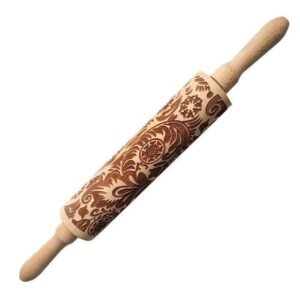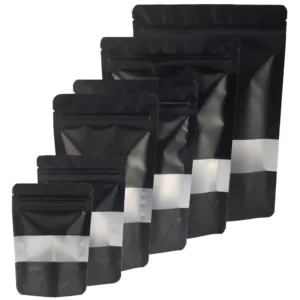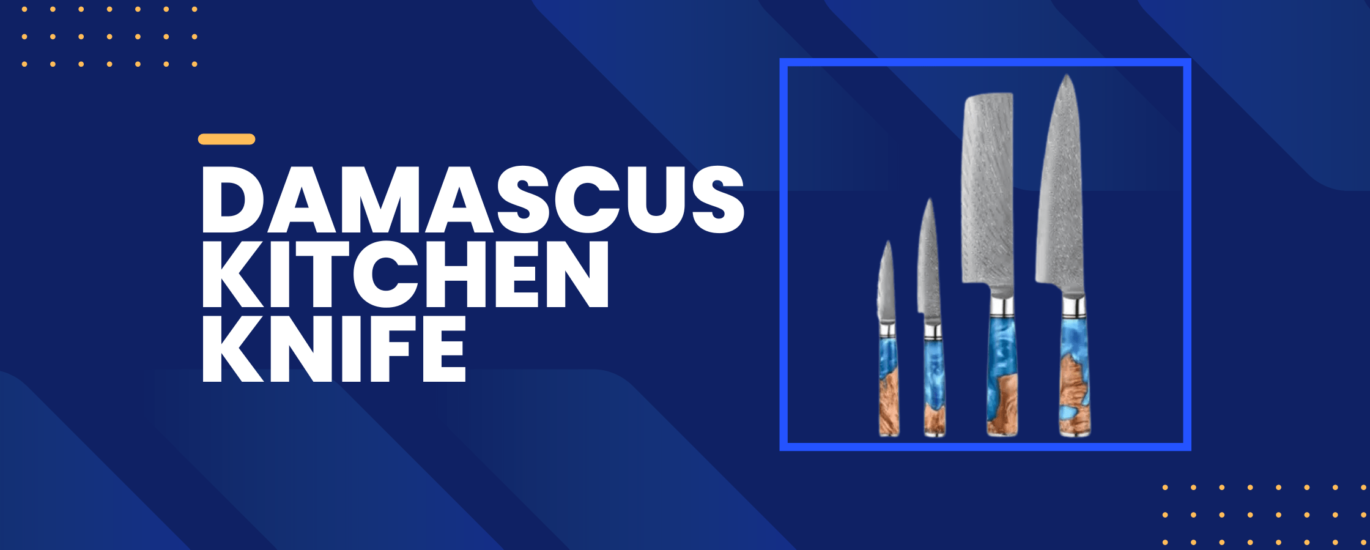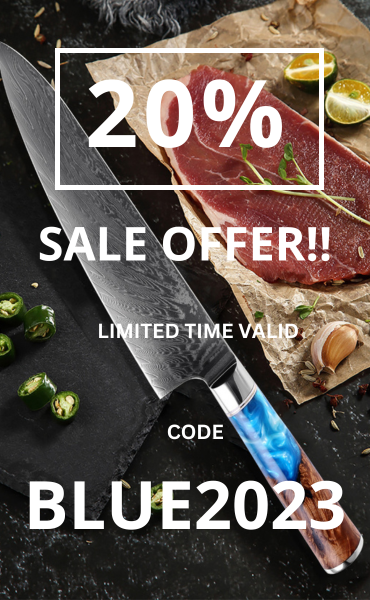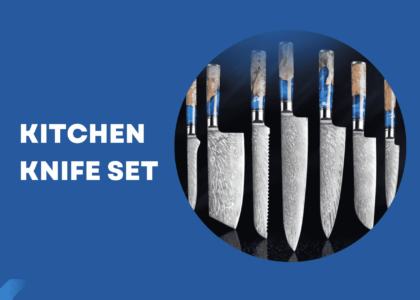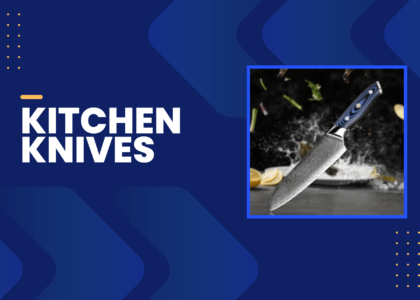Introduction and Historical Background
Brief on the Beauty and Functionality of Damascus Kitchen Knife
The Damascus Kitchen Knife is a paragon of both aesthetic and functional brilliance in the culinary world. Its intricate patterns and superior sharpness make it a coveted item among chefs and culinary enthusiasts alike. The knife is not merely a tool but a piece of art, enhancing the cooking experience with its exceptional quality and visually striking appearance.
The Damascus Kitchen Knife is often hailed as a masterpiece for chefs, with its distinctive Damascus patterns and unparalleled sharpness in slicing, cutting, and cooking. Whether referred to as a Damascus chef’s knife, Damascus blade, or simply a Damascus knife, it consistently represents the pinnacle of culinary tool excellence, blending historical craftsmanship with modern culinary needs.
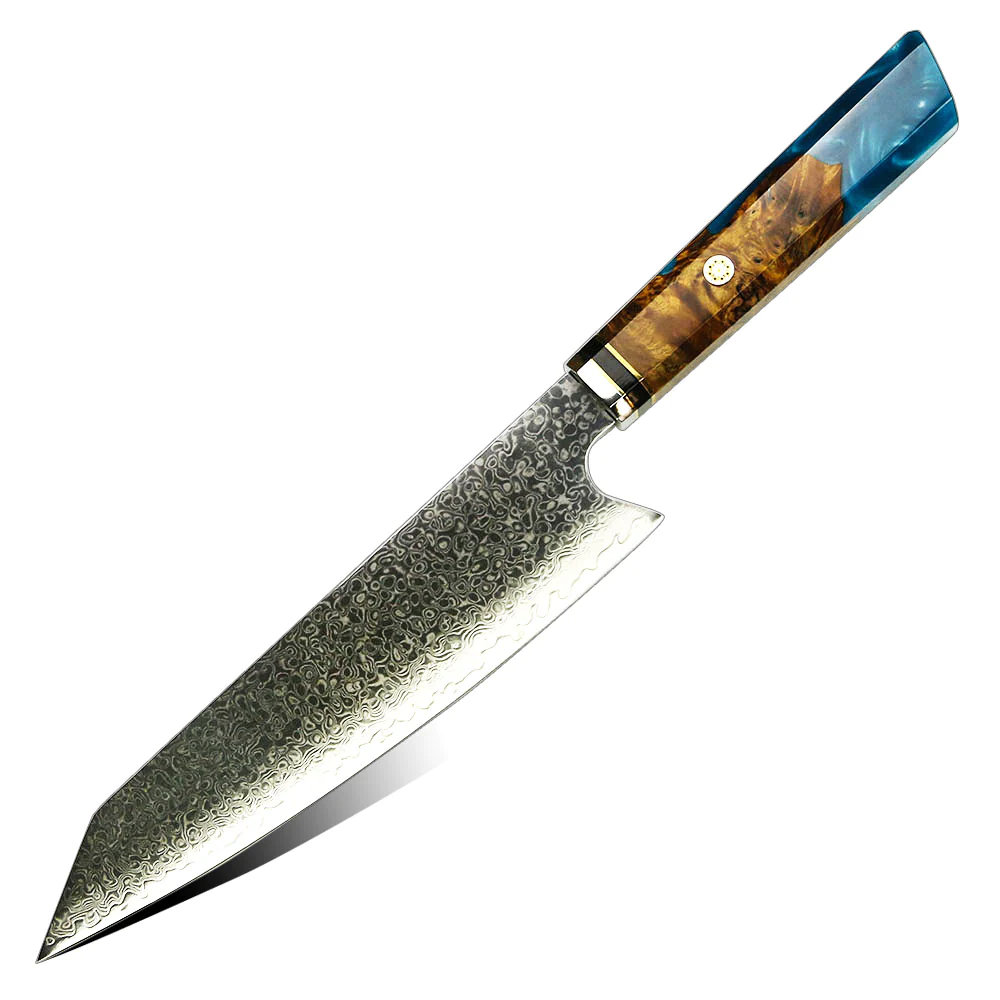
Historical Background of Damascus Steel
Origin and Ancient Making Process of Damascus Steel
Damascus steel originates from India and the Middle East, renowned for its distinctive wavy or watery pattern and impressive durability. The ancient making process involved forging layers of steel, creating a strong and resilient blade, which was then often used in sword-making. The unique patterns, resembling flowing water, are achieved through a meticulous process of folding and forging various steel types together, resulting in not only a robust material but also a visually stunning one.
Historical Significance and Uses in Culinary and Warfare
Historically, Damascus steel was utilized in various domains, from crafting formidable swords for warfare to creating exquisite knives for culinary purposes. The steel was famed for its ability to maintain sharpness and resist shattering, making it a preferred material in both violent battlefields and the meticulous environment of ancient kitchens. The legacy of Damascus steel has traversed through ages, symbolizing a pinnacle of craftsmanship and quality in various historical contexts. This exceptional material has been highly valued by chefs for its durability and sharpness.
Characteristics of Damascus Kitchen Knife
Description of the Unique Patterns and Sharpness
The Damascus Kitchen Knife is celebrated for its unique, flowing patterns on the blade, each one distinct and telling a story of its craftsmanship. The sharpness of these knives is unparalleled, capable of precise and clean cuts, making them a favorite among chefs seeking precision in their culinary creations. The patterns are not merely for aesthetic appeal but are a testament to the layered forging process that also contributes to the knife’s exceptional sharpness and durability.
Material and Build Quality of Damascus Knife
Damascus knives are crafted using a blend of various steels, forged and folded together, creating a robust and durable blade. The build quality is exceptional, with attention to detail not only in the blade but also in the handle, ensuring ergonomic comfort and optimal balance. The material and build quality of a Damascus Kitchen Knife are pivotal in providing a superior cutting experience, merging historical craftsmanship with contemporary culinary demands.
| Feature | Description |
|---|---|
| Material | Multi-layered steel |
| Pattern | Wavy, resembling flowing water |
| Sharpness | Exceptionally sharp and retains edge |
| Historical Significance | Used in ancient sword-making, symbol of quality and craftsmanship |
| Culinary Importance | Preferred by chefs for precision and durability |
Exploring the Elegance and Durability of the Damascus Kitchen Knife
Unveiling the Unique Beauty and Functionality of Knife Damascus
The Damascus Kitchen Knife, particularly the widely recognized Knife Damascus, is a manifestation of exquisite craftsmanship, combining two distinct types of steel folded into a pattern, crafting a singularly unique blade. Not only are these blades celebrated for their robustness and sharpness, but they are also revered for their intricate beauty, effortlessly handling rigorous kitchen tasks while also being a visual delight.
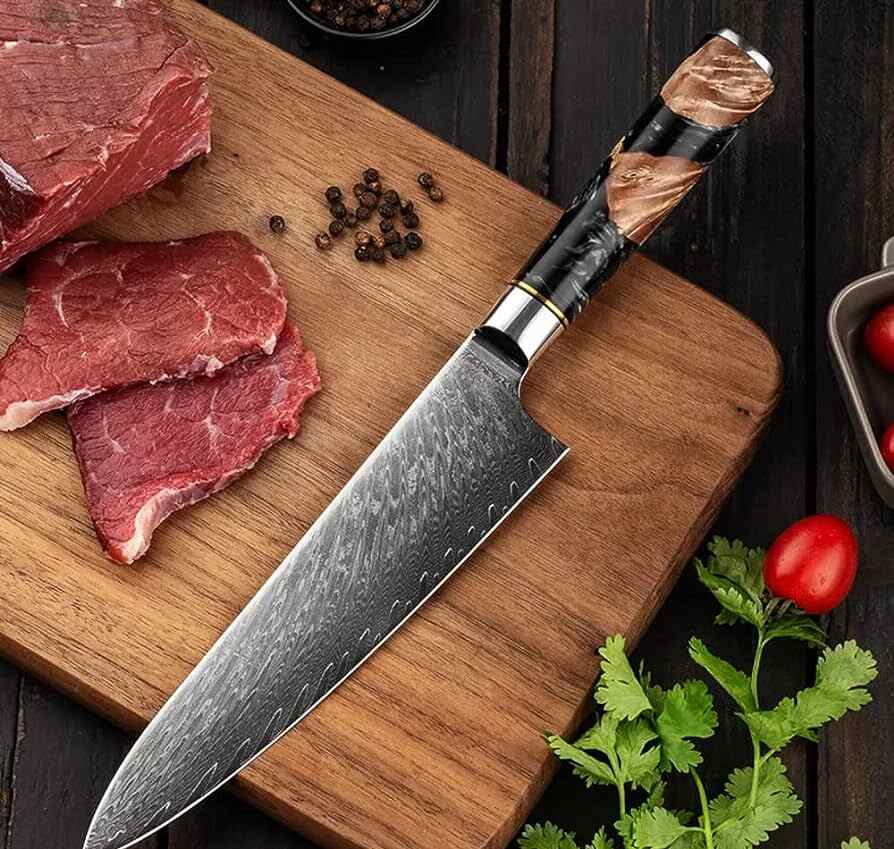
The Resilience and Versatility of Folded Steel Knives
Damascus steel, renowned for its popularity among knife aficionados, is crafted by folding two different metal types multiple times, resulting in a blade that is not only incredibly strong and durable but also capable of withstanding substantial wear and tear in the kitchen. The Damascus Kitchen Knife is not only adept at effortlessly slicing through various food items but also versatile enough to handle a myriad of culinary tasks, making it a staple in kitchens.
The Exquisite Bigunas Knife: A Culinary Marvel
In the vast market of Damascus knives, the Bigunas knife stands out for its large blade, ideal for a range of chopping and slicing tasks. Crafted from high-quality Damascus steel, it is not only durable but also resistant to wear, providing a reliable tool that combines functionality with aesthetic appeal. Its size and easy handling make it a versatile tool, capable of tackling various kitchen tasks from chopping vegetables to slicing through meats and bread.
The Timeless Appeal and Strength of Damascus Steel
Damascus steel is crafted by melding two different metal powders, creating a steel type renowned for its unique pattern and formidable strength. This steel type, utilized in various items like kitchen knives and swords, is not only aesthetically pleasing but also renowned for its durability and ease of maintenance, making it a popular choice for culinary tools.
Navigating Through the World of Damascus Steel Kitchen Knives
When it comes to selecting the best Damascus Kitchen Knife, considerations extend beyond just the type of steel and blade shape. Damascus steel, with its layers of folded metal, provides a blade that is not only stunningly patterned but also impressively durable and sharp. These knives, known for their sharpness retention and versatility in the kitchen, are also available in various sizes and grip styles, ensuring that you find the perfect fit for your hand and culinary needs.
Discovering the Copper Damascus Knife
In the realm of kitchen knives, the copper Damascus Knife emerges as a top contender. With blades crafted from the famed Damascus steel, these knives not only offer the sharpness and durability that chefs seek but also present a beautiful pattern that is characteristic of Damascus steel. Available in a variety of options, these knives are not only a testament to quality craftsmanship but also a valuable addition to any culinary toolkit.
Ensuring Quality with Your Damascus Knife Purchase
When seeking the best Damascus knives for your culinary adventures, considering brands like Spyderco and Gerber, known for their wide range of quality Damascus knives, ensures that you are investing in a tool that will not only meet but exceed your kitchen needs. Whether you are slicing, dicing, or chopping, a Damascus knife ensures precision and ease with every cut.
Maintenance and Care of Damascus Kitchen Knife
Proper Care for Longevity
Cleaning, Storing, and Handling of Damascus Knives
Ensuring the longevity and sustained quality of your Damascus Kitchen Knife involves meticulous care and mindful handling. Cleaning a Damascus knife should involve gentle hand-washing, and avoiding abrasive scourers to preserve the blade’s integrity. Storing the knife in a magnetic holder or a dedicated knife block prevents unnecessary dulling or damage to the blade. Handling it involves using a secure grip and utilizing appropriate cutting surfaces, such as wooden or soft plastic cutting boards, to maintain the blade’s sharpness.
Key Points:
- Hand-wash gently with mild detergent
- Store in a knife block or magnetic holder
- Use wooden or soft plastic cutting boards
Sharpening a Damascus Kitchen Knife
Techniques and Tools for Maintaining Sharpness
Maintaining the razor-sharp edge of a Damascus Kitchen Knife involves utilizing specific sharpening techniques and tools. Whetstones, honing rods, and professional sharpening services are viable options to ensure the blade retains its optimal sharpness. When using a whetstone, ensure it is soaked adequately, and maintain a consistent angle while sliding the blade across the stone. Honing rods are useful for realigning the blade’s edge between sharpenings, ensuring peak performance. Periodic professional sharpening can also be beneficial to uphold the blade’s quality and precision.
Key Points:
- Use whetstones or honing rods for at-home sharpening
- Maintain a consistent angle during sharpening
- Consider professional sharpening services periodically
| Maintenance Aspect | Tools/Methods | Frequency |
|---|---|---|
| Cleaning | Gentle hand-washing with mild detergent | After each use |
| Storing | Knife block or magnetic holder | Always |
| Sharpening | Whetstones, honing rods, professional services | As needed/Annually |
Conclusion
Summarizing the Allure and Prestige of Owning a Damascus Kitchen Knife
The enchantment of possessing a Damascus Kitchen Knife extends beyond its functional excellence to its historical and aesthetic significance. The mesmerizing patterns, coupled with unparalleled sharpness and durability, render it a timeless piece in any culinary collection. The Damascus knife is not merely a tool but a symbol of culinary artistry and historical craftsmanship, offering a sublime blend of beauty and practicality in every cut.
Final Thoughts on Making an Informed Purchasing Decision
Choosing to invest in a Damascus Kitchen Knife is embracing a piece of history, functionality, and an exquisite art form. It is pivotal to approach the purchase with a discerning eye, considering factors such as authenticity, craftsmanship, and user experience. The journey through the rich history of Damascus steel and understanding the intricacies of selecting a chef’s knife culminate in an informed decision, ensuring that the chosen blade is not only a kitchen tool but also a cherished possession that withstands the test of time.
In the entirety of this guide, the Damascus Kitchen Knife has been explored from its historical roots to its modern-day applications, providing a comprehensive view that intertwines its ancient allure with contemporary culinary demands. May your culinary adventures be enhanced by the precision and artistry of your chosen Damascus blade, carving through ingredients and time with equal finesse.
FAQs
Why Choose a Damascus Kitchen Knife?
Opting for a Damascus Kitchen Knife means embracing a blend of historical craftsmanship, unparalleled sharpness, and aesthetically pleasing designs, enhancing both culinary functionality and experience.
How to Verify the Authenticity of Damascus Steel?
Authenticating Damascus Steel involves examining its distinctive wavy patterns, ensuring a hand-forged crafting process, and potentially seeking verification from the manufacturer or certified sellers.
Can Damascus Steel Rust?
Yes, Damascus Steel can rust if not properly maintained. Regular cleaning, immediate drying, and occasional oiling are crucial to prevent corrosion and maintain its pristine condition.
Are Damascus Kitchen Knives Good?
Absolutely, Damascus Kitchen Knives are renowned for their exceptional sharpness, durability, and visually striking patterns, making them a premium choice in various culinary settings.
Is Damascus Steel Good for Cooking Knives?
Indeed, Damascus Steel is excellent for cooking knives due to its remarkable sharpness, durability, and ability to maintain a keen edge, ensuring precise and efficient cutting in culinary tasks.
Why Damascus Knife is So Expensive?
The high cost of a Damascus Knife is attributed to the intricate hand-forged process, quality materials, and the skilled craftsmanship required to create its unique patterns and exceptional quality.
Is Damascus Better Than Stainless Steel?
Damascus is often prized over stainless steel for its enhanced sharpness, durability, and distinctive patterns, although stainless steel may offer more resistance to corrosion and typically comes at a lower cost.
Frequently Linked Pages
1. Damascus Knife Set – Damascus Knife Set: A Modern Kitchen’s Quintessential Tool
2. Damascus Kitchen Knives – Crafting Excellence: Unveiling the World of Damascus Kitchen Knives
3. Damascus Chef Knife – Exploring the Elegance of the Damascus Chef Knife: A Culinary Marvel in Modern Kitchens
4. Damascus Knifes – Damascus Knifes: A Symphony of Craftsmanship and Functionality




